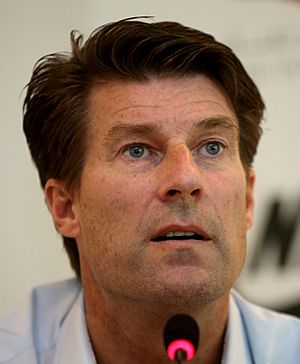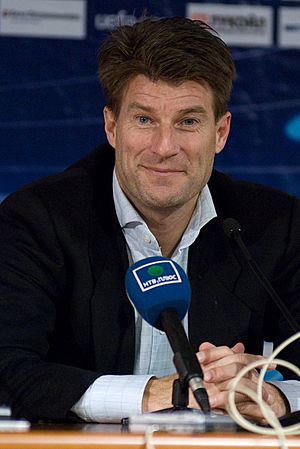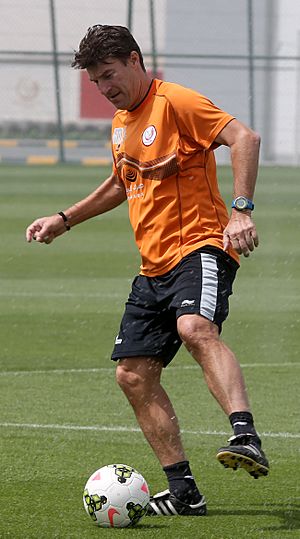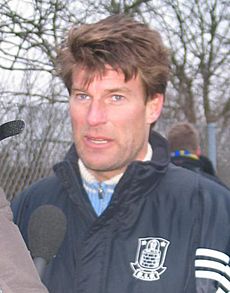Michael Laudrup facts for kids

Laudrup in 2016
|
||||||||||||||||
| Personal information | ||||||||||||||||
|---|---|---|---|---|---|---|---|---|---|---|---|---|---|---|---|---|
| Full name | Michael Laudrup | |||||||||||||||
| Date of birth | 15 June 1964 | |||||||||||||||
| Place of birth | Frederiksberg, Denmark | |||||||||||||||
| Height | 1.83 m (6 ft 0 in) | |||||||||||||||
| Position(s) | Attacking midfielder, forward | |||||||||||||||
| Youth career | ||||||||||||||||
| 1971–1973 | Vanløse | |||||||||||||||
| 1973–1974 | Brøndby | |||||||||||||||
| 1974–1980 | KB | |||||||||||||||
| Senior career* | ||||||||||||||||
| Years | Team | Apps | (Gls) | |||||||||||||
| 1981 | KB | 14 | (3) | |||||||||||||
| 1982–1983 | Brøndby | 38 | (24) | |||||||||||||
| 1983–1985 | Lazio | 60 | (9) | |||||||||||||
| 1985–1989 | Juventus | 103 | (16) | |||||||||||||
| 1989–1994 | Barcelona | 166 | (41) | |||||||||||||
| 1994–1996 | Real Madrid | 62 | (12) | |||||||||||||
| 1996–1997 | Vissel Kobe | 15 | (5) | |||||||||||||
| 1997–1998 | Ajax | 21 | (11) | |||||||||||||
| Total | 478 | (119) | ||||||||||||||
| International career | ||||||||||||||||
| 1980 | Denmark U17 | 4 | (2) | |||||||||||||
| 1980–1981 | Denmark U19 | 19 | (12) | |||||||||||||
| 1982 | Denmark U21 | 2 | (0) | |||||||||||||
| 1982–1998 | Denmark | 104 | (37) | |||||||||||||
| Managerial career | ||||||||||||||||
| 2002–2006 | Brøndby | |||||||||||||||
| 2007–2008 | Getafe | |||||||||||||||
| 2008–2009 | Spartak Moscow | |||||||||||||||
| 2010–2011 | Mallorca | |||||||||||||||
| 2012–2014 | Swansea City | |||||||||||||||
| 2014–2015 | Lekhwiya | |||||||||||||||
| 2016–2018 | Al Rayyan | |||||||||||||||
|
Medal record
|
||||||||||||||||
| *Club domestic league appearances and goals | ||||||||||||||||
Michael Laudrup is a famous Danish football coach and former player. He was born on June 15, 1964. Many people think he is one of the best midfielders of all time. He was known for his calm play, amazing passes, great vision, and excellent control of the ball. Michael is also the older brother of another famous footballer, Brian Laudrup.
During his time as a player, Laudrup won league titles with big clubs like Ajax, Barcelona, Real Madrid, and Juventus. He mostly played as an attacking midfielder, but he could also play in other attacking roles. He was a key part of Johan Cruyff's "Dream Team" at Barcelona. With Barcelona, he won nine trophies, including four La Liga titles in a row from 1991 to 1994. He also won the European Cup in 1992. After this, he moved to Barcelona's rivals, Real Madrid, in 1994. There, he won his fifth La Liga title in a row.
Laudrup first played for the Danish national team on his 18th birthday in 1982. He scored 37 goals in 104 games for his country. He played a big role in the 1986 FIFA World Cup. From November 1994, he was the captain of Denmark for 28 matches. This included leading them to victory in the 1995 Confederations Cup. He and his brother Brian played together for Denmark in the 1998 World Cup, where they reached the quarter-finals. He stopped playing professionally after that tournament.
In 1999, Laudrup was named the Best Foreign Player in Spanish Football over the previous 25 years. In April 2000, he was honored with the Order of the Dannebrog. In 2003, UEFA chose him as Denmark's "Golden Player," meaning he was their best player of the past 50 years. The Danish Football Union officially named him the best Danish footballer of all time in 2006. He was also included in Pelé's FIFA 100 list of the world's greatest living players in 2004. In 2013, fans of Marca newspaper voted him into the "Best foreign eleven in Real Madrid's history."
In October 2021, Michael Laudrup was named the greatest ever Danish sports star. This happened at a special event celebrating the 125th anniversary of the National Olympic Committee and Sports Confederation of Denmark.
After he stopped playing, Laudrup became a coach. He started as an assistant manager for the Denmark national team. His first job as a main manager was at his old club, Brøndby, in 2002. He led them to win the Danish Superliga championship in 2005. He then managed Getafe and had great success there. He led Getafe to the Copa del Rey final and the UEFA Cup quarter-finals. Their attacking style of play was highly praised. On June 15, 2012, Laudrup became the manager of Premier League club Swansea City. In his first season, he won the League Cup, which was Swansea's first major English trophy in 100 years. He later managed clubs in Qatar before finishing his coaching career in 2018.
Contents
Playing for Clubs: Michael Laudrup's Journey
Michael Laudrup was born in Frederiksberg, Copenhagen. He started playing football at his father Finn Laudrup's childhood club, Vanløse. When his father became a player-coach for Brøndby in 1973, the family moved. Both Michael and his brother Brian Laudrup started playing for Brøndby. Michael then followed his father to KB in 1976.
Starting His Professional Career
Laudrup made his first senior appearance for KB in 1981. He also played for the Danish under-19 national team that year. He scored 14 goals in 25 games at different youth levels. In 1982, he returned to Brøndby, where his father had finished his career. Laudrup helped Brøndby get promoted to the top division.
At Brøndby, Laudrup scored two goals in the club's first game in the top division. He scored 15 league goals in 1982, making him one of the top scorers. His great performance earned him the 1982 Danish Player of the Year award. In June 1983, he was sold to Juventus in Italy. This was the biggest transfer deal in Danish football at the time.
Time in Italy: Lazio and Juventus
Juventus already had two foreign players, so they first loaned Laudrup to Lazio. He scored two goals in his first game for Lazio. In his first year, Lazio barely avoided being relegated to a lower league. He stayed for a second year, but Lazio finished last and was relegated. Laudrup only scored one goal that season.
Laudrup returned to Juventus in 1985. In his first year back, he helped Juventus win the 1985–86 Serie A league title. They also won the Intercontinental Cup, where he scored a goal in the final. He was named Danish Player of the Year again in 1985. However, the next season was tough for Laudrup because of injuries. When Michel Platini retired in 1987, Laudrup was expected to lead the team. But he struggled to score goals, even though he played in all 30 matches.
Spanish Success: Barcelona's Dream Team
After six years in Italy, Laudrup joined Barcelona in 1989. He was excited to play for coach Johan Cruyff, who was his childhood hero. Laudrup quickly found great success under Cruyff. He believed Cruyff's ideas about football helped him play his best. He was one of the three foreign players allowed in the team. The others were Ronald Koeman and Hristo Stoichkov. These players, along with rising stars like Pep Guardiola, formed the famous "Dream Team."
The Dream Team played exciting football. They won four La Liga championships in a row from 1991 to 1994. They also won the 1991–92 European Cup in 1992, the 1992 UEFA Super Cup, and other Spanish cups. Laudrup was named the best player in Spain twice during his time at Barcelona. In 1993, Barcelona signed a fourth foreign player, Romário. This meant only three foreign players could play in each match. Laudrup was not chosen for the 1994 European Cup final, which Barcelona lost 4–0 to Milan. This marked the end of his time at Barcelona.
Moving to Rivals: Real Madrid
In 1994, Laudrup made a big move from Barcelona to their rivals, Real Madrid. He said he moved because Real Madrid was very eager to win again. He felt it was the perfect time to join a new team with a new coach and hungry players. On November 5, 1994, he helped Raúl score his first professional goal.
Laudrup helped Real Madrid win the league title in his first season. This ended Barcelona's winning streak. He became the only player to win the Spanish league five seasons in a row with two different clubs. Even though he only played two seasons for Real Madrid, fans still remember him fondly. In 2002, he was voted the 12th-best player in Real Madrid's history. After he left Barcelona, his former manager Cruyff said: "When Michael plays like a dream... no one in the world comes anywhere near his level."
Later Career and Retirement from Playing
In 1996, Laudrup left Real Madrid to play for Vissel Kobe in Japan. He scored two goals in his first game for Vissel Kobe. He helped Vissel get promoted to the top Japanese league.
He officially ended his playing career in 1998 after a championship-winning season with Dutch club Ajax. After retiring, Laudrup sometimes played for Lyngby's Old Boys team for fun.
International Career: Playing for Denmark
Laudrup was called up to the Danish national team when he was just 18 years old in 1982. He became the second-youngest player ever to play for Denmark. He played in all four of Denmark's matches at UEFA Euro 1984.
Laudrup also played in the 1986 FIFA World Cup in Mexico. He is famous for his amazing solo dribble and goal in Denmark's 6–1 win against Uruguay. He also scored one of Denmark's two goals at Euro 1988.
In November 1990, Laudrup decided to leave the national team. This was due to disagreements with coach Richard Møller Nielsen. Denmark did not qualify for Euro 1992 at first. However, they were given Yugoslavia's spot because of war in that country. Laudrup was on holiday and did not think Denmark would do well, so he did not join the team. But Denmark surprised everyone by winning the tournament! They beat the Netherlands in the semi-final and Germany 2–0 in the final.
Laudrup returned to the Danish team in August 1993. He scored a goal in Denmark's 2–0 win against Argentina in the 1995 Intercontinental Cup, which Denmark won. He also scored four goals as Denmark qualified for Euro 1996.
Laudrup's last games for Denmark were at the 1998 World Cup. He captained the team to the quarter-finals. He played his 100th game for Denmark in their first match of the tournament. He scored a goal against France and provided two assists against Nigeria. Denmark lost 3–2 to Brazil in the quarter-finals. Both Michael and Brian Laudrup announced their retirement from international football after this game. They were both named in FIFA's All-Star Team for the tournament.
Michael Laudrup's Playing Style
Michael Laudrup was a fast, smart, and very talented midfielder. He was known for his speed with the ball and is seen as one of the most effective and skilled attacking midfielders ever. He could play in many positions, including as a winger, a central midfielder, or even a second striker. At Barcelona, his coach Johan Cruyff sometimes used him as a centre-forward, similar to the modern "false 9" role. Laudrup is considered one of the best passers of all time and one of the most technically gifted players.
His brother Brian Laudrup said that Michael's vision, quick thinking, and passing were on a different level. He always knew what would happen before anyone else. Laudrup was also good at scoring goals, not just creating them.
He was nicknamed "The Prince of Denmark." Throughout his career, people praised his technique, balance, elegance, and amazing dribbling skills. His vision and passing range were also incredible. He could make deep passes, through balls, and crosses that led to many assists. Jorge Valdano, his coach at Real Madrid, said Laudrup "has eyes everywhere." His special move was looking one way and passing the other, which tricked many opponents.
Laudrup's famous dribble, called the croqueta, involved quickly moving the ball from one foot to the other to get away from a defender. This move was later made popular by Andrés Iniesta. Laudrup's ball skills and feints (fake moves) were combined with his creativity. This led to the phrase "Made in Laudrup" in Spanish football. It described his unique assists, especially his lobbed passes. Many of his teammates said, "Just run, he will always find a way of passing you the ball."
What Others Said About Laudrup
Many famous football figures praised Laudrup. Michel Platini called him one of the most talented players ever. Raúl said Laudrup was the best player he ever played with. Romário thought Laudrup could create and score goals almost whenever he wanted. Luís Figo called Laudrup arguably the best opponent he ever faced. Ronald Koeman said Laudrup was "possibly the most skillful and elegant player [he] ever played with."
Diego Maradona stated, "Michael is one of the greatest." Thierry Henry named Laudrup as the best player he never played with. He said Laudrup was an amazing passer and did not get enough credit. Franz Beckenbauer called Laudrup the best player of the 90s. Javier Clemente said, "To me, Michael Laudrup is the most genius player the world has ever seen."
Hristo Stoichkov, who scored many goals from Laudrup's passes at Barcelona, said it was "extremely easy" to play with him. He believed Laudrup could only be compared to players like Maradona. Iván Zamorano, a Real Madrid teammate, called Laudrup "El Genio" (The Genius). Zamorano said Laudrup had "three eyes" because he could make chances out of nothing. Andrés Iniesta, who used Laudrup's famous dribble, rated Laudrup as the greatest player of all time.
Some people questioned Laudrup's work rate at times. Michel Platini once said Laudrup was "the greatest player in the world, in training," but wished he used his talent more in matches. Johan Cruyff said Laudrup was "one of the most difficult players [he had] worked with." He felt Laudrup rarely gave 100% effort, even though 80-90% was still better than most. Despite this, Laudrup was known for his good behavior on the field and never received a red card in his career.
Coaching Career: Leading Teams to Victory
After his playing career, Laudrup became a coach. He started as an assistant coach for the Denmark national team in 2000. He worked with head coach Morten Olsen. They led Denmark to the knockout stage of the 2002 World Cup.
Brøndby: First Managerial Role
After his success with Denmark, Laudrup became the manager of Danish Superliga club Brøndby. He brought in new attacking players and gave chances to young talents. He won his first trophy as a manager, the 2002 Danish Supercup. In his first season, he led Brøndby to win the Danish Cup and finish second in the league. He was named Danish Manager of the Year.
In the 2004–05 season, he finally led Brøndby to win the Danish Superliga title. He also won his second Danish Cup that season, completing "The Double." He received his second Danish Manager of the Year award. After four successful seasons, Laudrup left Brøndby in June 2006.
Getafe: Spanish Adventure
On July 9, 2007, Laudrup became the manager of Spanish club Getafe. During his time there, the club reached the final of the Copa del Rey and the quarter-finals of the UEFA Cup. He brought an exciting, attacking style of football to the club. He only stayed for one season, leaving in May 2008.

Swansea City: English Triumph
On June 15, 2012, Laudrup was appointed manager of Swansea City in the Premier League. He was the first Dane to manage in the Premier League. He signed new players like Michu and Pablo Hernández. His first game was an impressive 5–0 win against Queens Park Rangers.
Laudrup was praised for his smart signings, especially Michu, who scored 22 goals in 2012. On February 23, 2013, he led Swansea to their first major cup final ever. They beat Chelsea in the semi-finals of the League Cup.
On February 24, 2013, Laudrup won his first trophy with Swansea. His team beat Bradford City 5–0 in the Football League Cup final at Wembley. This was Swansea's first major trophy in their history. On March 8, 2013, Laudrup signed a new contract with Swansea until 2015. However, on February 4, 2014, he was sacked by Swansea after a difficult period in the league.
Lekhwiya and Al Rayyan: Coaching in Qatar
On June 30, 2014, Laudrup became the new manager of Qatar Stars League champions Lekhwiya. He led Lekhwiya to win the Qatar Stars League and the Crown Prince Cup in his first season. The club also reached the quarter-finals of the 2015 AFC Champions League. He left Lekhwiya in June 2015.
On October 3, 2016, Laudrup became the manager of Al Rayyan in Qatar. He managed the team until July 2018.
Laudrup's Coaching Style
As an assistant manager for Denmark, Laudrup learned to use a 4–2–3–1 system. This system used fast wingers and focused on short passes to control the game. He used a similar style at Brøndby, making the team more attacking. He continued this attacking, free-flowing style at Getafe.
At Swansea City, Laudrup kept the team's focus on passing and possession. He also made them more attacking. He signed many new players, especially from Spain, to bring that attacking style to Wales. He believed that simple passes could be very effective. Laudrup was praised for keeping Swansea's attractive style of play, which helped them win the League Cup.
Life Outside Football
Family Life
Michael Laudrup comes from a family of footballers. His uncle, Ebbe Skovdahl, was also a manager. His father, Finn Laudrup, played for the Danish national team. Michael has a son named Mads Laudrup from his first marriage. Mads has been a captain for Danish youth national teams. Michael is now married to Siw Retz Laudrup. They have two children, Andreas and Rebecca. Andreas also played football and was part of the under-16 national team.
Michael's younger brother, Brian Laudrup, was also a famous footballer. Brian won the Danish Player of the Year award four times. He was rated as the fifth-best player in the world by FIFA in 1992. Brian was part of the Danish team that won UEFA Euro 1992, but Michael did not play in that tournament. In 2004, both Laudrup brothers were named in the FIFA 100 list of the 125 greatest living footballers.
Business Ventures
Besides football, Laudrup started importing Spanish wine to Denmark in 1993. What began as a hobby grew into a successful company called Laudrup Vin og Gastronomi. His company now has many employees and imports wines from all over the world.
In 2004, Laudrup also helped start CEPOS. This is a Danish group that supports ideas about free markets and individual freedom.
Honors and Achievements
As a Player
Juventus
- Serie A: 1985–86
- Intercontinental Cup: 1985
Barcelona
- La Liga: 1990–91, 1991–92, 1992–93, 1993–94
- Copa del Rey: 1989–90
- Supercopa de España: 1991, 1992
- European Cup: 1991–92
- UEFA Super Cup: 1992
Real Madrid
- La Liga: 1994–95
Ajax
- Eredivisie: 1997–98
- KNVB Cup: 1997–98
Denmark National Team
- FIFA Confederations Cup: 1995
Individual Awards
- Danish Player of the Year: 1982, 1985
- Don Balón Award – La Liga Best Foreign Player of the Year: 1991–92
- FIFA World Cup All-Star Team: 1998
- Best Foreign Player in Spanish Football (1974–1999)
- UEFA Golden Player (Greatest Danish Footballer of the last 50 Years): 2003
- FIFA 100 (chosen by Pelé)
- Denmark's Best Player of All Time: 2006
- Scandinavia Best Player Ever: 2015
- Danish Football Hall of Fame
As a Manager
Brøndby
- Danish Superliga: 2004–05
- Danish Cup: 2002–03, 2004–05
- Danish League Cup: 2005
- Danish Supercup: 2002
Swansea City
- Football League Cup: 2012–13
Lekhwiya
- Qatar Stars League: 2014–15
- Crown Prince Cup: 2014–15
Individual Awards
- Danish Manager of the Year: 2002–03, 2004–05
Special Honors
- Order of the Dannebrog: 2000
See also
 In Spanish: Michael Laudrup para niños
In Spanish: Michael Laudrup para niños
- List of European association football families
- List of men's footballers with 100 or more international caps
 | Jewel Prestage |
 | Ella Baker |
 | Fannie Lou Hamer |



